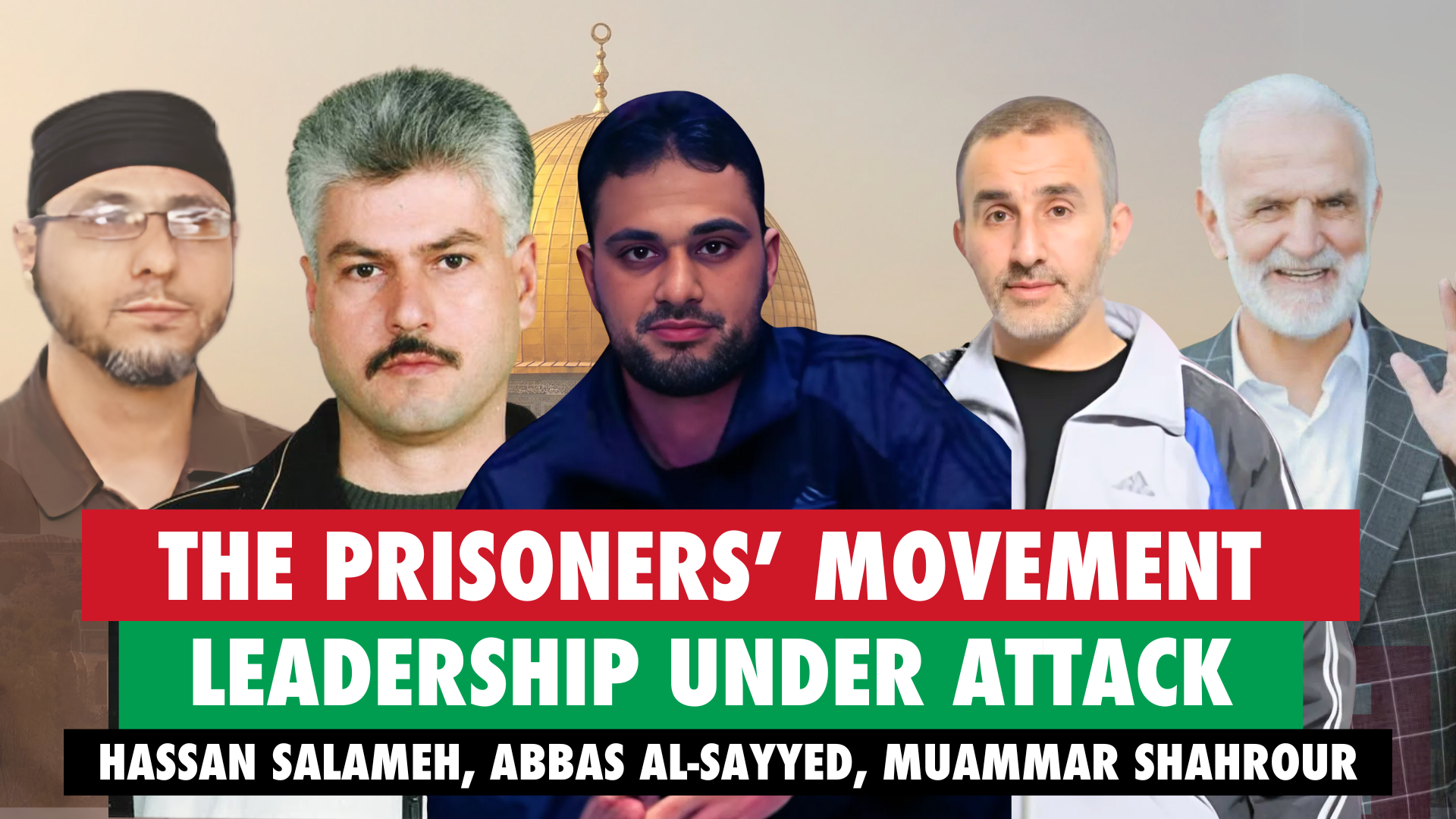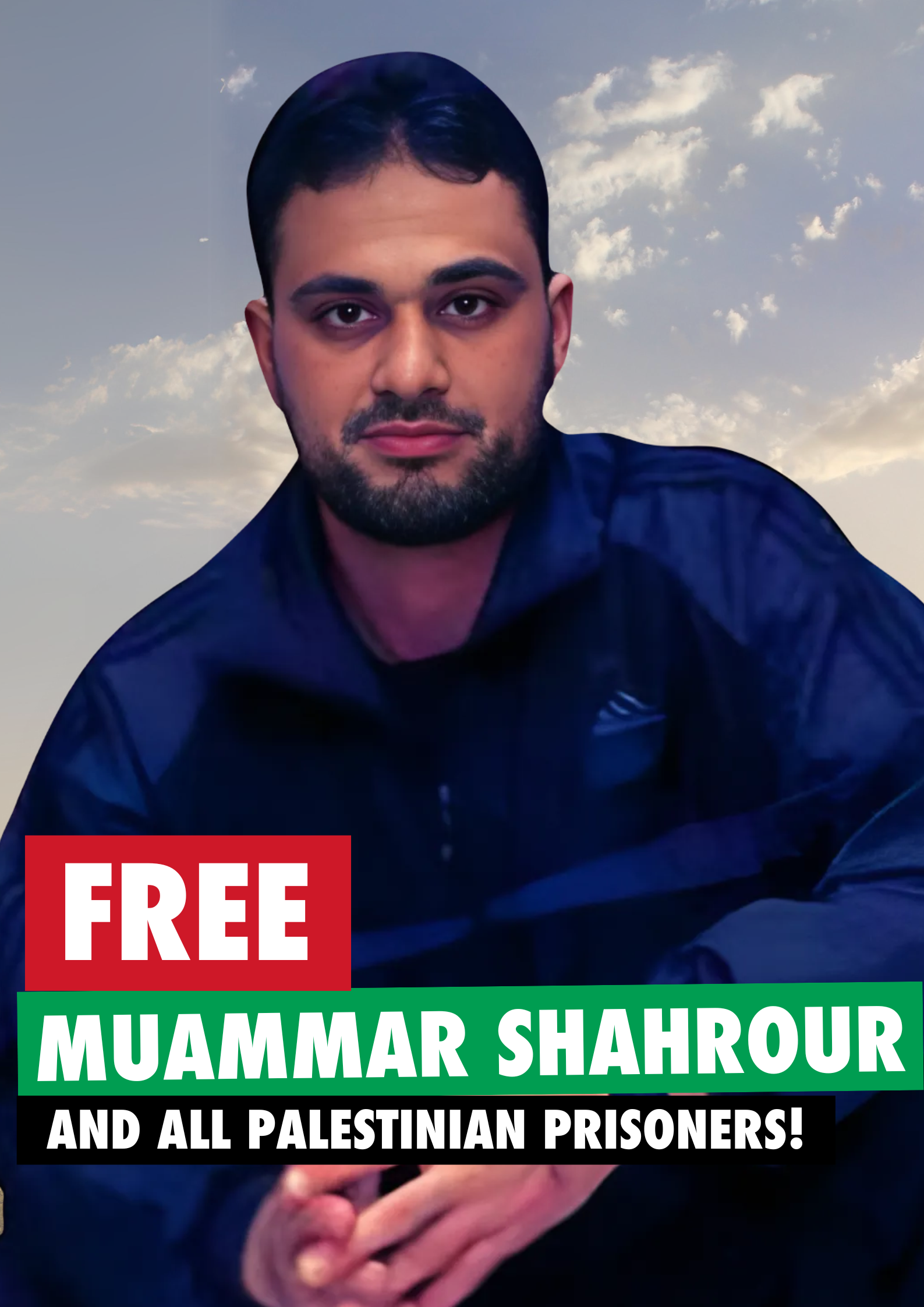
Amid the ongoing assault on Palestinian prisoners, where denial of medical care is being used systematically by the Zionist occupation as a method of “slow assassination,” and where over 65 Palestinian prisoners have been martyred due to torture, assault, starvation and medical neglect since 7 October 2023, leaders of the prisoners’ movement are being particularly targeted for torture, isolation and liquidation behind colonial bars. Leaders like Abdullah Barghouti, Sheikh Mohammed al-Natsheh, Ahed Abu Ghoulmeh, Marwan Barghouti and Ibrahim Hamed have been beaten and assaulted behind bars, and the violations are escalating rapidly, putting the lives of the leadership of the prisoners’ movement at risk. Leaders like Abbas al-Sayed, Hassan Salameh and Muammar Shahrour are currently suffering under torture and isolation, denied medical care, communication and independent monitoring of their condition.
These attacks on the prisoners’ movement leadership are part and parcel of the ongoing Zionist-imperialist genocide in Gaza and throughout occupied Palestine and part of the ongoing assassination policy of the occupation targeting the leadership of the Palestinian resistance. We urge supporters of Palestine around the world to act and organize to demand their liberation and that of all Palestinian prisoners as part and parcel of ending the genocide in Gaza — on the road to the liberation of Palestine from the river to the sea.
Hassan Salameh

Hassan Salameh is one of the leaders of the Palestinian prisoners’ movement, serving the third longest sentence in occupation prisons, after Abdullah Barghouti and Ibrahim Hamed. Born in 1971 in Khan Younis, Gaza, he was deeply involved in the Palestinian liberation struggle from the time of the first great Intifada of 1987. A leader in the Izz el-Din al-Qassam Brigades, he became known for the “Holy Revenge” resistance operations, in retaliation for the assassination of the al-Qassam engineer, Yahya Ayyash, in 1996.
He was arrested by the occupation in al-Khalil in May 1996 and sentenced to 46 life sentences by an occupation military court. The occupation has repeatedly refused to release him in prisoner exchanges. He previously spent 13 years in solitary confinement, only returned to his brothers and comrades among the Palestinian prisoners after the Karameh hunger strike of 2012.
Hassan Salameh married the released prisoner Ghufran Zamel in 2010, and the occupation continues to prevent her from visiting him since their marriage; she has only been able to visit him twice during his imprisonment. During his time in occupation prisons, he has written several books, including a memoir on solitary confinement as well as writings about the Palestinian resistance.
Since 7 October 2023, he has been held in solitary confinement and transferred between the isolation sections of multiple prisons; he is currently held in isolation in Megiddo prison. He has been repeatedly physically assaulted, beaten six times in the past two months. He has also been denied medical care for his injuries and for the results of systematic starvation. His weight has dropped to 62 kilograms, and he has lost teeth while his vision has degraded significantly. In short, Hassan Salameh is held in solitary confinement, subjected to periodic beatings and denied any sort of medical care by the occupation, in a clear example of the policy of “slow assassination”.
Abbas al-Sayyed

Abbas al-Sayyed is one of the leaders of the Palestinian prisoners’ movement, serving a lengthy sentence; the occupation has repeatedly refused to release him in prisoner exchanges with the Palestinian resistance. Born in Tulkarem in the West Bank of occupied Palestine in 1966, he is a leader in the Hamas movement and was a leader of the Izz el-Din al-Qassam Brigades in the West Bank during the Al-Aqsa Intifada.
A graduate in mechanical engineering from Yarmouk University in Jordan, al-Sayyed dedicated his skills to advancing the cause of Palestinian liberation. He is married and the father of two children. He has been imprisoned since 8 May 2002 and was sentenced by the occupation military courts to 35 life sentences plus 100 years for his leadership in multiple resistance operations, most notably the Park Hotel operation in Netanya.
Behind prison bars, he has been a leader in the prisoners’ movement, organizing its ranks, leading hunger strikes and developing the prisoners’ internal front. On 7 October 2023, like Hassan Salameh, he was immediately transferred to isolation in Ramon prison. As a result of medical neglect, he began to lose vision in his eyes and has developed the scabies skin disease, which the occupation has deliberately encouraged to run rampant in the prisons, denying the prisoners access to even the most basic medical care and hygiene supplies. Like his fellow prisoners, he has been subjected to the starvation policy, causing his weight to decline to 55kg inside the isolation cells.
On multiple occasions in recent months, repression units have stormed into his isolation cell, beating him severely and subjecting him to torture. He has been barred from communicating with his lawyer or receiving any medical or legal visits. This policy of systematic torture and isolation — away from any form of independent or international monitoring — is part and parcel of the assassination policy targeting the prisoners’ movement leadership.
Muammar Shahrour

Muammar Shahrour, born in Tulkarem in the West Bank of occupied Palestine in 1979, is another leader of the prisoners’ movement subjected by the occupation to severe torture and medical neglect under the “slow assassination” policy directed at the prisoners’ movement leadership.
Sentenced to 29 life sentences plus 20 years in prison, he is a representative of the Hamas movement to the prisoners’ leadership and representation committees. He comes from a long line of resistance through his family, who have contributed to all of the streams of historical and present-day Palestinian resistance to colonialism and occupation.
His grandfather, Hajj Sharif Shahrour, was arrested by the British and served 4 years in prison for his role in the 1936-1939 revolution in Palestine. His uncle, Shawqi Shahrour, established PLO military bases and organized fedayeen brigades transporting ammunition, weapons and fighters between Jordan and Palestine. He served 18 years in Zionist prisons for an operation he carried out in Jerusalem with Fatima Bernawi, and young Muammar visited him from an early age. His other uncle, Bassem Shahrour, was martyred in Tunis when the Zionist forces bombed the PLO headquarters there in 1985.
Muammar Shahrour participated in the great popular Intifada as a child from the age of 8, and was detained by the occupation on many occasions. He participated in many strikes, sit-ins and actions in support of the prisoners’ movement. When he finished high school, he attended the Sports College at Kadoorie University in Tulkarem and achieved a black belt in karate, tutoring children and youth in martial arts. He then attended the Al-Quds Open University to study Islamic education, and joined the resistance with the Al-Qassam Brigades. He was determined to struggle for the liberation of Palestine and to take revenge for the assassination of his close friend and comrade, Amer al-Hudairi, who was assassinated with three US-provided Zionist missiles when he entered his car after leaving Muammar’s home.
He participated with Abbas al-Sayyed in planning and implementing military operations with the al-Qassam Brigades, including the Park Hotel operation, and became wanted, pursued by both the Palestinian Authority and the occupation. Finally, he was arrested by the occupation in Dhinnaba, outside Tulkarem, after an ongoing battle and the arrest of his mother, sisters and brothers by the occupation, in 2002. He was sentenced to one of the longest sentences in occupation prisons after months of torture and military interrogation.
Muammar Shahrour has been held in solitary confinement in Megiddo prison since January 2024, during which he has been subjected to repeated invasions of his cell by repressive forces accompanied by severe beatings. Most recently, he was beaten six times on six separate occasions within the span of just one week, with particular attention to beating his head and chest in order to inflict the greatest possible damage. Due to the starvation policy, his weight has decreased to only 55 kg. He suffers from rheumatoid arthritis and has been denied treatment for months, exacerbating the pain from the beatings and torture.
**
The Prisoners’ Media Office appealed in a statement:
“In the depths of the dark cells, where light barely reaches, the symbols and leaders of the Palestinian prisoners’ movement in the occupation’s prisons are waging an unequal battle against a systematic machine of death, specifically designed to eliminate the remaining living consciences that embody the memory and will of Palestinian struggle.
Abdullah al-Barghouthi, Hassan Salameh, Sheikh Muhammad Jamal al-Natsheh, Abbas al-Sayyed, Muammar Shahrour, and others among the leaders of the prisoners’ movement are not merely names topping prisoner lists. They are the nucleus of resistance consciousness and the symbols of this stage, and of Palestinian steadfastness behind bars. They face a vicious assault targeting their very human and revolutionary existence, under the cover of international silence and moral complicity…
These men were never mere numbers in the registers of captivity; they are lanterns that lit the path for an entire generation of strugglers, bearing the responsibility of preserving Palestinian human dignity inside the occupation’s cells.
Today, they are being pushed toward the end in a brutal scene that reflects the barbarity of the occupation and the complete absence of the bare minimum of ethical values from the international community.
The Nakba is repeating itself inside the prisons.
What is happening is no longer just a violation — it is part of a comprehensive genocide targeting both body and soul, completing the chapters of the Palestinian Nakba in its most brutal form. Those who kill the leaders of the prisoners aim to strike at the moral, cultural, and political structure of an entire people.
We, at the Prisoners Media Office, are not merely warning — we are crying out to the world: the leaders are being killed slowly, and we are losing the pillars of patience and steadfastness one after the other.
We do not have the luxury of time — the final hour has struck, and every moment of silence is an indirect participation in the crime.
We hold the occupation fully responsible for the lives of the imprisoned leaders, and we call upon international and human rights institutions — and every free voice in this world — to raise their voices loudly:
“Save what remains of our humanity behind bars.”
We join the call of the Prisoners’ Media Office and urge all supporters of Palestine and the Palestinian cause to speak out actively and take action through demonstrations, mass actions and direct actions to confront the abuse of Palestinian prisoners. The imperialist powers, like the US, Canada, Britain, Germany, France and the Netherlands, that continue to arm, support and provide cover for the Zionist genocide in Gaza and throughout occupied Palestine, are fully implicated in these inhuman actions.
Our entire movement must respond collectively to such repression by organizing even more loudly, clearly and effectively to shut down the imperialist-Zionist war machine, to support the Palestinian resistance and all forces of resistance in the region, and to ensure that the Palestinian prisoners are not now and will never be isolated from the Palestinian people, the Arab, Islamic and regional liberation causes, and the international movement for justice.
Freedom for all Palestinian prisoners in occupation jails! Victory to the Resistance!
From the river to the sea, Palestine will be free!
Discover more from Samidoun: Palestinian Prisoner Solidarity Network
Subscribe to get the latest posts sent to your email.




